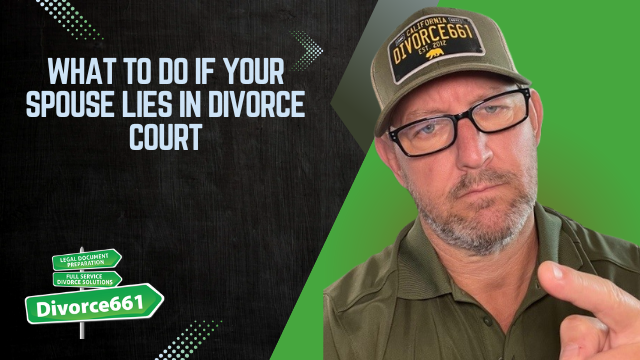What to Do If Your Spouse Lies in Divorce Court
Divorce can be a tumultuous journey, and encountering dishonesty in court can make it even more challenging. If you’ve found yourself in a situation where your spouse has lied during your divorce proceedings, it’s crucial to know how to respond effectively. In California, the stakes are high, as lying under oath can lead to serious legal repercussions. Here’s a guide on how to navigate this difficult terrain.
The Importance of Honesty in Divorce Court
Honesty is the cornerstone of any legal proceeding, especially in divorce cases. In California, all court filings and testimonies are submitted under penalty of perjury. This means that any false information presented can not only skew the decisions regarding income, assets, and custody but can also lead to legal penalties for the dishonest spouse.
Understanding Perjury and Its Consequences
Lying under oath is considered perjury, a serious offense that can lead to criminal charges. If your spouse is caught lying, the court has the authority to reverse decisions, impose penalties, and even award additional property or attorney fees to the honest spouse. This underscores the importance of presenting truthful information during the proceedings.
Gathering Evidence: Your Best Defense
When faced with dishonesty, your first line of defense is to gather evidence. Document everything relevant to your case. This can include pay stubs, tax returns, emails, and any other communication that supports your claims.
Types of Evidence That Hold Weight in Court
Judges rely on concrete evidence to make informed decisions. Here are some types of documentation that can be crucial in your case:
- Financial Records: This includes bank statements, tax returns, and proof of income.
- Communication Logs: Keep records of emails, text messages, and any correspondence that may be relevant.
- Legal Documents: Ensure you have copies of all court filings, agreements, and previous judgments.
Real-Life Examples: Exposing Lies in Court
Consider a real case where a client’s ex attempted to lower child support by underreporting income. By gathering business receipts and tax returns, we were able to expose the truth, leading to a recalculated support amount that fairly reflected the actual earnings.
The Impact of Exposing False Claims
This case highlights the potential consequences of dishonesty in court. By exposing lies, not only can you achieve a fair outcome, but you can also hold the dishonest party accountable. The court can reverse decisions, impose penalties, and ensure that the honest spouse receives what they are owed.
How Divorce661 Can Assist You
At Divorce661, we specialize in helping clients navigate the complexities of divorce cases, especially when dishonesty is involved. Our team is dedicated to organizing and presenting your evidence clearly and professionally.
Our Approach
We assist in filing the right motions to challenge false information and present your case based on facts, not emotions. By exposing lies, you can achieve the justice you deserve. Here’s how we can help:
- Organizing Evidence: We help you compile and present your documentation effectively.
- Filing Motions: Our team will file the necessary motions to challenge any false claims made by your spouse.
- Clear Presentation: We ensure that your case is presented in a clear and compelling manner to the court.
Taking Action: Protecting Your Rights
Facing dishonesty in your divorce case can be overwhelming, but taking action is essential. By gathering evidence and working with professionals, you can expose the truth and protect your rights every step of the way.
Getting Started
If you’re dealing with dishonesty during your divorce, don’t hesitate to reach out for help. Visit Divorce661.com for a free consultation. We’re here to guide you through this challenging process and ensure that you achieve a fair outcome.
Conclusion: The Power of Truth
The truth is a powerful tool in legal battles. By understanding your rights and gathering the necessary evidence, you can effectively counter false claims and ensure justice prevails. Remember, dishonesty in court is not just an ethical issue; it can have serious legal consequences. With the right support, you can navigate your divorce with confidence and integrity.
Engage with Us
Have you experienced dishonesty during your divorce? We’d love to hear your story. Comment below or reach out to us for support. Together, we can work towards a resolution that honors the truth.

